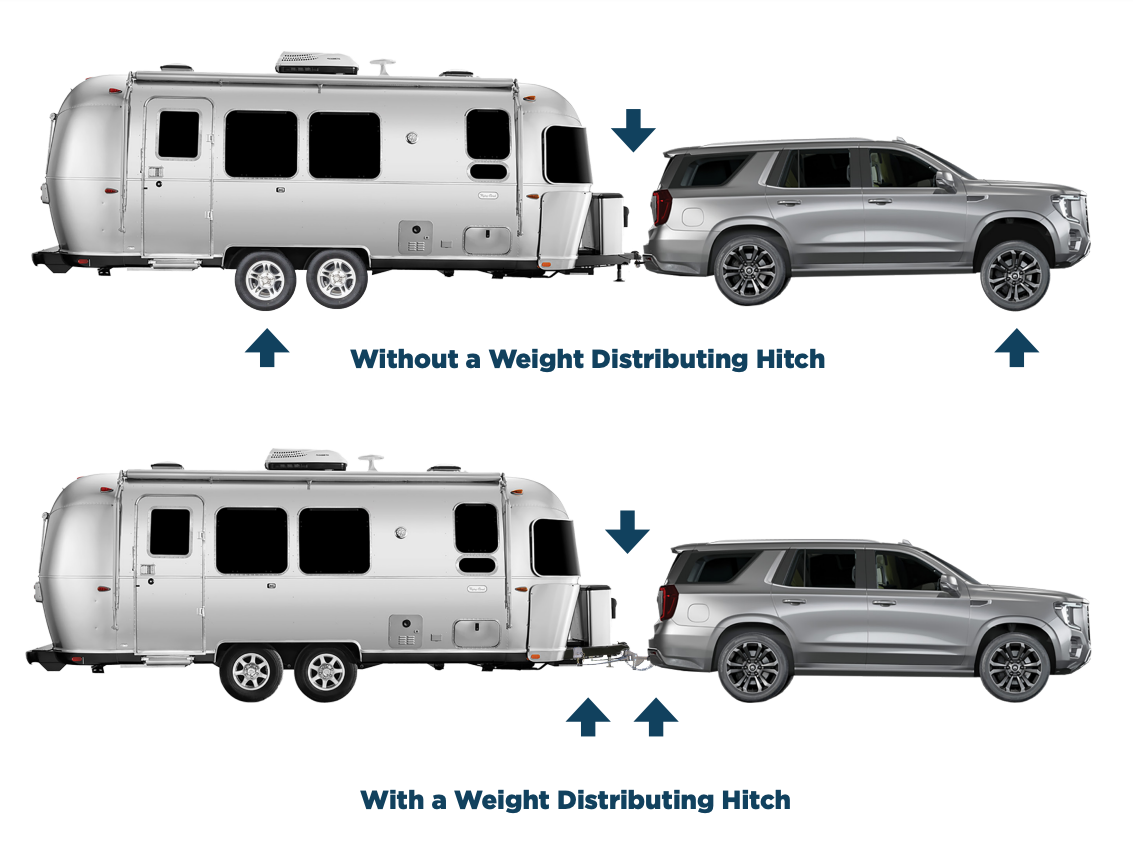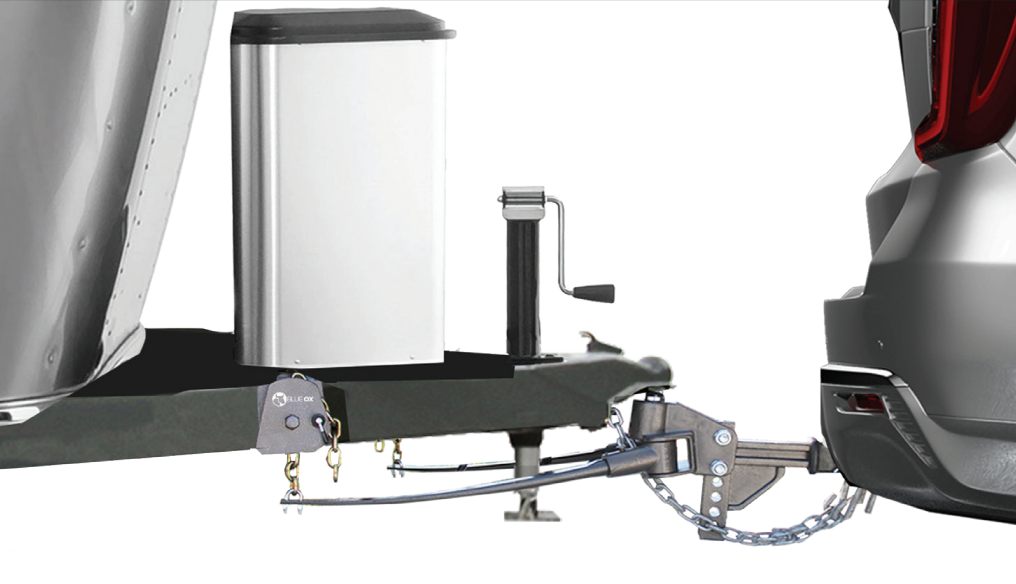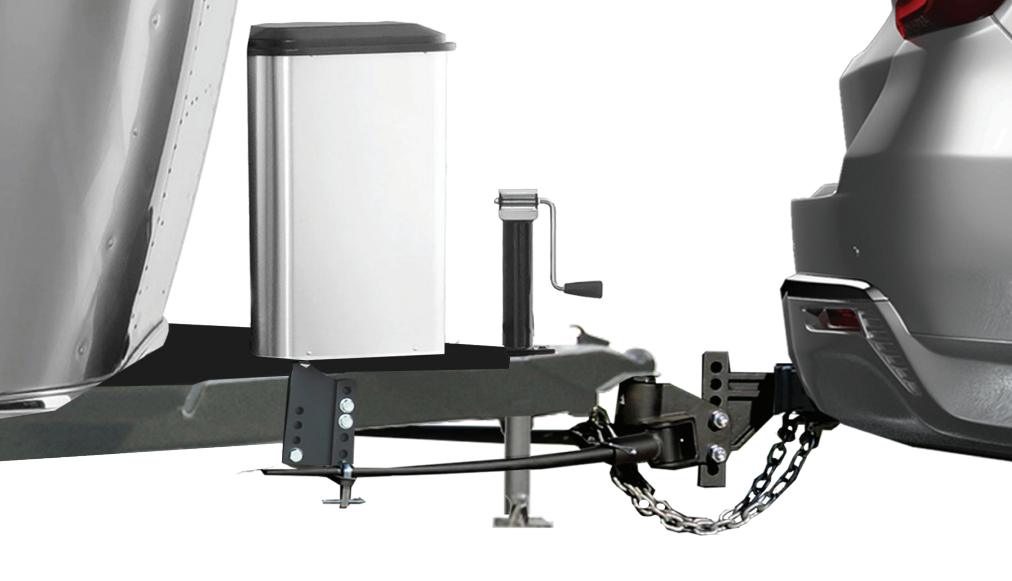What is a weight distribution hitch and why do we recommend them while towing an Airstream? A weight distribution hitch (aka “load equalizing hitch”) is a hitch that evenly distributes the weight of your payload. It works by using adjustable spring bars and tension to distribute the load of the trailer tongue to the trailer and vehicle axles.

Selecting the Right Weight Distribution Hitch
Which weight distribution hitch is right for your Airstream travel trailer?

Blue Ox SwayPro™ - For Single Axle or Dual Axle Travel Trailers
- Evenly distributes weight over axles of the tow vehicle and trailer
- Noise-free sway prevention never stops working, even in rain or snow
- Caster in the hitch head constantly centers the trailer
- Spring bars augment the suspensions of the tow vehicle & trailer
- Rotating latches with clamp-on brackets for quick and easy setup
- Backup without disconnecting
- Powder-coated steel construction

Blue Ox TrackPro™ - For Single Axle Travel Trailers (Compatible with Basecamp)
- Evenly distributes weight over axles of the tow vehicle and trailer
- Manages sway caused by bad roads, wind, and weather
- Caster in the hitch head constantly centers the trailer
- Spring bars augment the suspensions of the tow vehicle & trailer
- Rigid L-brackets provide additional points of sway controlling friction
- Backup without disconnecting
- Powder-coated steel construction

Does a weight distribution hitch reduce tongue weight?
Weight distribution works to distribute the tongue weight of a travel trailer up to the front axle of the tow vehicle so that it will sit more level. By distributing more weight across the vehicle, the overall towing experience is optimized with better handling and braking.
Note: Weight distribution hitches do not “reduce” tongue weight or allow you to tow beyond the capacities of the vehicle.
Can I tow more with a weight distribution hitch?
No. If your hitch is rated for use with weight distribution, the weight distribution system will allow you to tow at the maximum capacity of the hitch. Weight distribution doesn’t "increase” your hitch’s weight capacity so much as it allows the hitch to be used at its maximum capacity
What does tongue weight mean?
The tongue weight is the static force the travel trailer tongue exerts on the hitch ball.
For instance, if a 2,000-pound conventional trailer is loaded with 1,000 pounds of cargo, the proper tongue weight of the loaded trailer should be between 300 and 450 pounds, or 10-15 percent of the loaded 3,000-pound total.
The hitch weight (with LP included) is included in the product specifications for each Airstream travel trailer model. Please refer to the owner's manual or official website for hitch weight and towing specifications.
Are tongue weight and hitch weight the same?
Yes. Tongue weight and hitch weight are both terms that refer to the force the travel trailer tongue exerts on the hitch ball.
What happens if tongue weight is too heavy?
If the tongue of the travel trailer does not exert enough downward force on the tow vehicle’s hitch ball, meaning that the trailer’s tongue weight is too light, a dangerous condition called trailer sway could result. If the tongue weight is too heavy, the steering of the tow vehicle will be affected.
Learn what to do if your travel trailer begins swaying while towing >
Risks of towing more than your vehicle capacity.
Maximum towing capacity should be taken seriously. Exceeding what your vehicle is designed to tow can strain your engine and transmission, accelerate brake wear, damage your tires, or warp your chassis — potentially leading to property damage or injury.